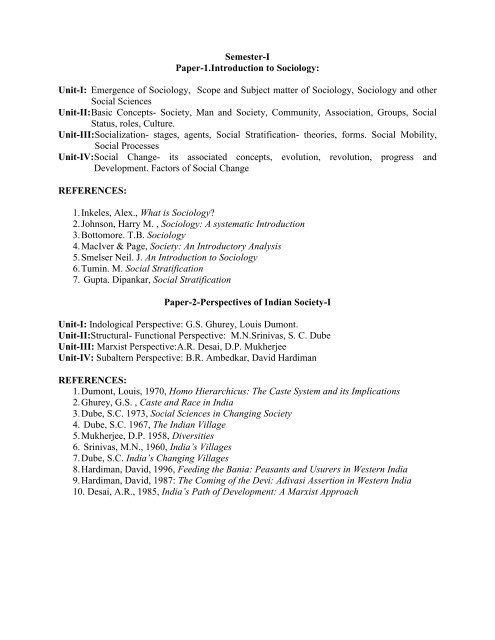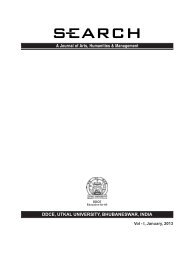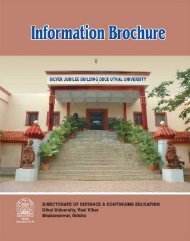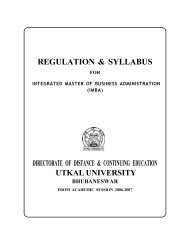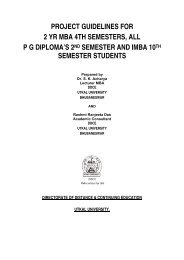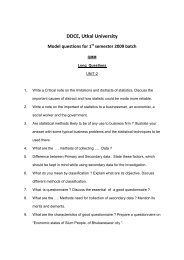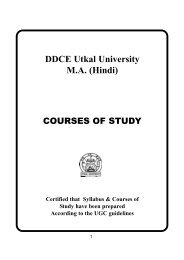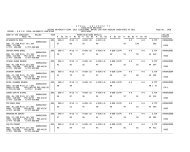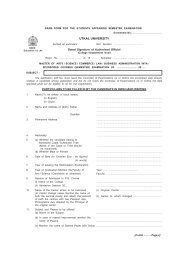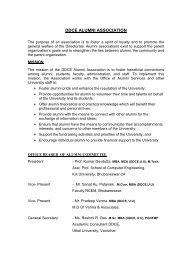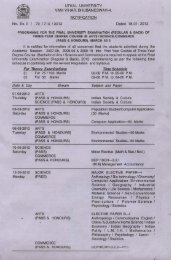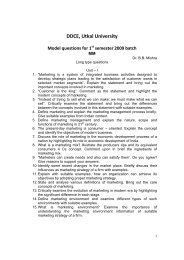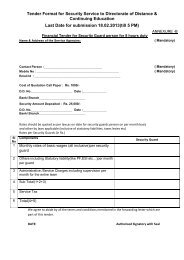M.A. Sociology Syllabus Details - DDCE, Utkal University ...
M.A. Sociology Syllabus Details - DDCE, Utkal University ...
M.A. Sociology Syllabus Details - DDCE, Utkal University ...
Create successful ePaper yourself
Turn your PDF publications into a flip-book with our unique Google optimized e-Paper software.
Semester-I<br />
Paper-1.Introduction to <strong>Sociology</strong>:<br />
Unit-I: Emergence of <strong>Sociology</strong>, Scope and Subject matter of <strong>Sociology</strong>, <strong>Sociology</strong> and other<br />
Social Sciences<br />
Unit-II: Basic Concepts- Society, Man and Society, Community, Association, Groups, Social<br />
Status, roles, Culture.<br />
Unit-III: Socialization- stages, agents, Social Stratification- theories, forms. Social Mobility,<br />
Social Processes<br />
Unit-IV: Social Change- its associated concepts, evolution, revolution, progress and<br />
Development. Factors of Social Change<br />
REFERENCES:<br />
1. Inkeles, Alex., What is <strong>Sociology</strong>?<br />
2. Johnson, Harry M. , <strong>Sociology</strong>: A systematic Introduction<br />
3. Bottomore. T.B. <strong>Sociology</strong><br />
4. MacIver & Page, Society: An Introductory Analysis<br />
5. Smelser Neil. J. An Introduction to <strong>Sociology</strong><br />
6. Tumin. M. Social Stratification<br />
7. Gupta. Dipankar, Social Stratification<br />
Paper-2-Perspectives of Indian Society-I<br />
Unit-I: Indological Perspective: G.S. Ghurey, Louis Dumont.<br />
Unit-II:Structural- Functional Perspective: M.N.Srinivas, S. C. Dube<br />
Unit-III: Marxist Perspective:A.R. Desai, D.P. Mukherjee<br />
Unit-IV: Subaltern Perspective: B.R. Ambedkar, David Hardiman<br />
REFERENCES:<br />
1. Dumont, Louis, 1970, Homo Hierarchicus: The Caste System and its Implications<br />
2. Ghurey, G.S. , Caste and Race in India<br />
3. Dube, S.C. 1973, Social Sciences in Changing Society<br />
4. Dube, S.C. 1967, The Indian Village<br />
5. Mukherjee, D.P. 1958, Diversities<br />
6. Srinivas, M.N., 1960, India’s Villages<br />
7. Dube, S.C. India’s Changing Villages<br />
8. Hardiman, David, 1996, Feeding the Bania: Peasants and Usurers in Western India<br />
9. Hardiman, David, 1987: The Coming of the Devi: Adivasi Assertion in Western India<br />
10. Desai, A.R., 1985, India’s Path of Development: A Marxist Approach
Paper-3.Classical Sociological Theory<br />
Unit-I: August Comte: Law of Three Stages, Hierarchy of Sciences, Theory of Positivism<br />
Unit-II: Emile Durkheim: Division of Labour, Theory of Suicide, Social Facts And Theory of<br />
Religion<br />
Unit-III: Max Weber: Protestant Ethics and Spirit of Capitalism, Theory of Authority &<br />
Bureaucracy, Ideal Types, Theory of Social Action<br />
Unit-IV: Karl Marx: Dialectical Materialism, Capitalism, Alienation, Class and Class<br />
Struggle.<br />
REFERENCES:<br />
1. Abraham, J.H. & Morgan, 1985, Sociological Thought from Comte to Sorokin<br />
2. Aron, Raymond, 1965, Main Currents in Sociological Thought, Vol. I & II<br />
3. Coser, L.A. 1977, Masters of Sociological Thought<br />
4. Giddens, Anthony 1997, Capitalism and Modern Social Theory- An Analysis of<br />
Writings of Marx, Durkheim and Weber<br />
5. Adams, B.N. & Sydie R.A. 2000, Sociological Theory<br />
6. Zetlin Irvin. 1981, Ideology and the Development Sociological Theory<br />
Paper-4-Research Methodology-I<br />
Unit-I: Philosophy of Social Sciences, Sciological Research: Pure & Applied, Ethical Issues in<br />
Social Research<br />
Unit-II: Relation between Data, Theory and Method, Research Design Exploratory, Descriptive,<br />
Diagnostic and Experimental Research<br />
Unit-III: Sampling,Observation, Interview , Questionnaire,<br />
Unit-IV: Scaling Techniques, Likert, Thustern, Bogardus.<br />
REFERENCES:<br />
1. Kalton & Moser, Survey Methods in Social Investigation<br />
2. Goode & Hatt, Methods of Social Research<br />
3. Young. P.V., Social Survey and Social Research<br />
4. Sjoberg, G and Roger, N., Methodology of Social research<br />
5. Cocharam. W.G., Sampling Techniques<br />
6. Lundeberg, Social Research<br />
7. Galtung, John, Theory & Methods of Social Research<br />
SEMESTER-II<br />
Paper-5.Modern Sociological Theory<br />
Unit-I: Symbolic Interactionism: Goffman, G.H. Mead, Blumer/<br />
Unit-II: Phenomenology & Ethnomethodology: Alfred Schutz, Peter Berger, Harold Garfinkel<br />
Unit-III: Critical Theory: Habermas, Marcuse, Adorno.<br />
Unit-IV: Post Modernism: Foucault, Derrida<br />
REFERENCES:
1. Turner, J.H. 1995, The Structure of Sociological Theories<br />
2. Giddens, Anthony, 1984, The Constitution of Society: Outline of the Theory of<br />
Structuration<br />
3. Blumer, ‘Society as Symbolic Interaction’ in Human Behaviour and Social Process<br />
4. Schutz, Alfred, The phenomenology of the Social world<br />
5. Berger Peter L and Thomas Luckman, 1966, The Social construction of Reality<br />
6. Garfinkel, Harold, 1967, Studies in Ethnomethodology<br />
7. Giddens, Anthony, 1979, Central problems in Social Theory<br />
8. Abraham, M.F. 1990, Modern Sociological Theory: An Introduction<br />
Paper-6. Perspectives of Indian Society-II<br />
Unit-I: Unity & Diversity :Caste: origin, structure, function and change<br />
Unit-II: Family, & Kinship: Structure, types, functions and Changes, Marriage: Hindu<br />
marriage as a religious sacrament, Marriage among different and religious groups,<br />
changing trends in marriage<br />
Unit-III: processes of Social Change in India: Sanskritization, Westernization<br />
Modernization<br />
Unit-IV: Contribution of Social Reforms in India: Affirmative laws for SC, ST, OBC and<br />
Women<br />
REFERENCES:<br />
1. Oomen T.K. and P.N. Mukherjee, 1986, Indian <strong>Sociology</strong>: Reflections and Introspections<br />
2. Karve Irawati, 1961, Hindu Society: An Interpretation<br />
3. Dumont, Louis, 1970, Homo Hierarchicus: The Caste System and its Implications<br />
4. Srinivas M.N., 1966, Social Change in Modern India<br />
5. Mukherjee, D.P. 1958, Diversities<br />
6. Singh, Y., 1973, Modernization of Indian Tradition<br />
7. Singh, Y, 1986, Indian <strong>Sociology</strong>: Social conditioning and emerging Concerns<br />
8. Tylor, Stephen, India: An Anthropological Perspective<br />
Paper-7-Research Methodology-II<br />
Unit-I: Statistics in Social Research, Mean, Median, Mode, Standard Deviation<br />
Unit-II: Case study Method in Social Research, Qualitative Data Format and Processing,<br />
Validity and reliability in Qualitative Research and Content Analysis.<br />
Unit-III: Social Research, Action Research and Participatory Research<br />
Unit-IV: Report Writing: stages, procedures.<br />
REFERENCES:<br />
1. Goode & Hatt, Methods of Social Research<br />
2. Young. P.V., Social Survey and Social Research<br />
3. Kalton & Moser, Survey Methods in Social Investigation<br />
4. Lundeberg, Social Research
Paper-8-<strong>Sociology</strong> of Globalization<br />
Unit-I: Globalization: The Historical and Social Context, Distinctive Characteristics and<br />
Dimensions: Economic, Technological, Social and cultural.<br />
Unit-II:Modernization and Globalization, Neo-Liberalism and Global Capitalism and<br />
Globalization and Nation State<br />
Unit-III: Global Institutions and Actors: World Bank, MNCs, WTO, IMF, NGOs<br />
Unit-IV: Globalization and Culture: The Ethos of Globalization (Individualism, Freedom,<br />
Consumerism) Cultural Homogenization, Hegemony and Dominance Impact of<br />
Globalization on poor and women<br />
REFERENCES:<br />
1. Appadurai, Arjun, 1997, Modernity at Large: Culture Dimension of Globalization<br />
2. Schuurman, FJ (ed), 2002, Globalization and Development Studies: Challenges for the 21 st<br />
century<br />
3. Tim Allen and Alan Thomas (ed), 2000, Poverty and Development into the 21 st century<br />
4. Somayaji, Sakarama & Somayaji Ganesha, 2006, <strong>Sociology</strong> of Globalization<br />
5. Pramanick, Swapan Kumar and Ganguly rmanuj,2010, Globalization in India: New<br />
Frontiers and Challenges<br />
6. Sahoo, Ajay Kumar, 2006, Sociological Perspectives on Globalization<br />
Paper-9-Rural <strong>Sociology</strong><br />
Unit-I. Rural <strong>Sociology</strong>: Its Emergence, Importance, Nature and Scope of Rural <strong>Sociology</strong><br />
Unit-II: Village Community: Characteristics, Types and Rural-Urban Contrast and Continuum<br />
Unit-III: Rural Social Structure, Agrarian and Peasant Social Structure, Caste & Politics, Major<br />
Peasant Movements in India.<br />
Unit-IV: Rural Development Programmes: IAY, SGSY, SHGs, Panchayati Raj.<br />
REFERENCES:<br />
1. Desai. A.R., Rural <strong>Sociology</strong> in India<br />
2. Dube. S.C. India’s Changing Village<br />
3. Bertrand. A.L., Rural <strong>Sociology</strong><br />
4. Shah. G., Gandhian Approach to Rural Development<br />
5. Dey. S.K., Panchayati Raj<br />
6. Puri. K.E., Social System in Rural India<br />
7. Gillette. J.M., Rural <strong>Sociology</strong><br />
8. Dube. S.C., Contemporary India & Its Modernization<br />
9. Dhanagare. D.N., Peasant Movements in India<br />
10. Desai. A.R., Peasant Struggles in India
Semester-III<br />
Paper-10.Gender Studies<br />
Unit-I. Social construction of gender: Gender Vs Biology, Equality Vs Differences,<br />
Public and Private Dichotomy. Patriarchy as ideology and practice.<br />
Unit-II. Status of women through various Ages: Ancient, Mediaval, pre- colonial, post-<br />
Colonial.<br />
Unit-III. Issues affecting women, Women and Education, Women and Health , Women and<br />
work and Domestic Violence<br />
Unit-IV: Women Rights, laws and Women Movements<br />
REFERENCES:<br />
1. Oakley, Ann. 1972, Sex, Gender and Society<br />
2. Rege Sharmila. 2003, <strong>Sociology</strong> of Gender: The Challenge of Feminist Sociological<br />
Knowledge.<br />
3. Alketar, A.S. 1983, The position of Women in Hindu Civilization<br />
4. Dule, Leela et.al (eds) 1986, Visibility and power Essays on Women in society and<br />
development<br />
5. Vaid, S & K. Sangari, 1989, Recasting Women: Essays in Colonial History<br />
6. Gandhi, N and N.Shah 1992, The issues at stake: Theory and Practice in the<br />
contemporary Women’s Movement in India.<br />
7. Ghadially, Rehana (ed) 1988, Women in Indian Society.<br />
8. Mies Maria. 1980, Indian Women and Patriarchy: Conflicts and Dilemmas of<br />
students and working women<br />
Paper-11-<strong>Sociology</strong> of Health<br />
Unit-I: <strong>Sociology</strong> of Health: its aim & scope, Contribution of <strong>Sociology</strong> to Health, Definition of<br />
Health & Illness- Four Dimensions of Health and Evolution of Social medicine in India<br />
Unit-II:Hospital as Social Organization, Types of Hospitals-General Hospitals, Specializing<br />
Hospitals. Functions of hospitals, Interpersonal relationship in Hospital settings.<br />
Unit-III:Community Health- the concept, Community health problems in India and Concept of<br />
Integrated health service<br />
Unit-IV:Health services in five year plans, Health for All- Alma Ata to current and Health<br />
policy of Govt. of India<br />
REFERENCES:<br />
1. Dasgupta, R. 1993, Nutritional planning in India<br />
2. Albreeht, Gary L. & Fitzpatrick, R. 1994. Quality of life in healthcare: Advances in<br />
Medical <strong>Sociology</strong><br />
3. Banerjee, D. 1981. Poverty, Class and Health culture in India<br />
4. DAK.T.M.(ed) 1991. <strong>Sociology</strong> of Health in India<br />
5. Madan T.N. 1980. Doctors and Society<br />
6. Oommen, T.K. 1978. Doctors and Nurses: A Study in Occupational roles, structure<br />
7. Venkatram, R 1979. Medical <strong>Sociology</strong> in Indian setting<br />
8. Mehta, S.R. 1998 Society and Health: A Sociological Perspective<br />
9. Chandani, Ambika 1986. The Medical Profession: A sociological exploration
Paper-12-<strong>Sociology</strong> of Environment<br />
Unit-I:Environmental <strong>Sociology</strong>: The rise, decline & resurgence of Environmental<br />
<strong>Sociology</strong><br />
Unit-II:Environmental Issues: Population & its impact on Environment, Pollution, Energy,<br />
Urban Development & its impact<br />
Unit-III: Development, Displacement, Rehabilitation and Environmental Problems,<br />
Environmental Impact Assessment<br />
Unit-IV: Global Challenges related to Environment and Environmental Justice, policy &<br />
action<br />
REFERENCES:<br />
1. Giddens. Anthony, 1996, Global problems and Ecological Crisis, in Introduction to<br />
<strong>Sociology</strong><br />
2. Arnold, David and Guha Ramachandra, 1955. Nature, Culture, Imperialism<br />
3. South Commission, 1989, The Need to Re Orient Development Strategies and<br />
Development the Environment<br />
4. World Commission on Environment and Development, 1987. Our Common Future,<br />
Brutland Report<br />
5. Gadgil Madhav and Ramachandra Guha, 1996, Ecology and Equity<br />
Paper-13-<strong>Sociology</strong> of Movements<br />
Unit-I: Defining features & dynamics of social movements, types of social movements &<br />
distribution of power in society<br />
Unit-II:The Social base: Class, Caste, gender: role & types of leadership, social change,<br />
reform, revival, revolution, splits, counter movements Transformation & decline<br />
Unit-III:Theories and emergence of social movements, Marxist & post Marxist, Weberian &<br />
post Weberian<br />
Unit-IV:Traditional Movement, Nationalist Movement, Tribal Movement, New social<br />
Movement, Women’s Movement, Environmental Movements<br />
REFERENCES:<br />
1. Rao MSA. 1979, Social Movements in India<br />
2. Singh KS. 1982, Tribal Movements in India<br />
3. Rao MSA. 1979, Social Movements and Social Transformation<br />
4. Desai AR (ed) 1979, Peasant struggles in India<br />
5. Dhanagare. DN. 1983, Peasant Movements in India 1920-1950<br />
6. Oomen TK. 1990, Protest and changes: studies in Social movements<br />
Paper-14.<strong>Sociology</strong> of Crime & Deviance<br />
Unit-I:Conceptual and Theoretical Approaches: Legal, Behavioural and Sociological<br />
explanation of Crime, Deviance and Delinquency, Theories of Crime causation-<br />
Classical, Positivist<br />
Unit-II:Theories of Punishment: Retributive and Detterent and Reformative- Protection and<br />
Parole, Open Prison- it success and failure
Unit-III:Terrorism: Concept of Terrorism and its characteristics, Origin and development<br />
Terrorism in India, Social and legal Major for its prevention and control<br />
Unit-IV: Community policing: Nature and concept, SObjectives, types, social relevance and<br />
Significance.<br />
REFERENCES:<br />
1. Ahuja, R. 1997, Contemporary Social Problems in India<br />
2. Madan, G.R. 1985, Indian Social Problems-I<br />
3. Mohanty, S. 1990, Crimes and Criminals in India<br />
4. Sirohi, J.P.S. 1992, Criminology and Criminal, Administration<br />
5. Shankardas, R.D. 2000, Punishment and the Prison: India and International<br />
Perspective<br />
Paper-15: <strong>Sociology</strong> of NGOs<br />
Paper-16: <strong>Sociology</strong> of Education<br />
Unit – I : Introduction : Conceptual clarity, Relationship between society, Education and<br />
Development.<br />
Unit – II : Socialization and Education :Relations between socialization and Education,<br />
Agencies of socialization and Education: Family, Peer Groups, School and Meida<br />
Unit – III : Education, Inequalities and Social Justice: Concept of Equality of Educational<br />
Opportunity, Education and Disparities: Caste. Class, tribe, gender, rural-urban,<br />
Education and social mobility<br />
Unit – IV : Emerging Trends in Education in India:School education: Existing scenario,<br />
Higher Education in India, Governance of Higher Education: Institutional<br />
programmes, National Educational policy 1986.<br />
REFERENCES<br />
1. Banks, Olive (1976) The sociology of Education, London, Batsford<br />
2. Boudon, Raymond (1973) Education Opportunity & Social Inequality, New Yark John<br />
wiley & sons<br />
3. Blackledge, D. and Hunt B (1985) sociological interpretations of education, Crom Helm,<br />
London<br />
4. Brookover, Wilburt B. (1955) A sociology of education New York,American book<br />
company<br />
5. Chitnis, sume and Altbach, Philip G (1993) Highter education reform in India, New Delhi<br />
Sage<br />
6. Ghosh, D.K (1983) <strong>University</strong> system in India, Jaipur, Rawat.<br />
7. Gibson, D.W (1965) social perspectives on education, New York, John Wiley & sons.
Paper-17: History of depressed class movement in India<br />
Unit-I: Historical Background<br />
1. Buddha’s humanitarian Synthesis of Mind and Matter.<br />
2. Social Dimensions of Medieval Mukti Movements- Kabir, Ravidas, Chokhamela, Sarala<br />
Dasa to Achyutananda Dasa.<br />
3. Impact of the Ideologies of American Revolution (1776) and French Revolution (1789).<br />
4. Impact of the Abolition of Slavery in U.S.A. (1865).<br />
5. Global Theory of Slavery and Oppression – Theories of Rousseau’s “Chained Man” ,<br />
Marx’s “Alienated Man” and Ambedkar’s “Broken Man”.<br />
Unit-II: Dynamics of Social Radicalism<br />
1. Jotiba Phule: His Ideology and Programmes – “Satyasodhak Samaj”, Education as<br />
Emancipation and Empowerment-Rewriting of History and Mythology.<br />
2. Bhima Bhoi’s Ideology and Programme- His Writings and Perspectives of Social Protest.<br />
3. Jyoti Thass: Ideology and Programmes of the Justice Party.<br />
4. Periyar and the Self-Respect Movement in South.<br />
Unit-III: Nationalist Power Politics and the Excluded Masses<br />
1. The Depressed Classes’ Revolt for Human Rights: The Mahad Satyagraha (1927).<br />
2. Demand of ‘Political Right’ for the Depressed Classes – Gandhi and Ambedkar at the<br />
Round Table Conferences (1930-1932) - The Poona Pact (1932): Its Implications and<br />
Consequences.<br />
3. Gandhian Ideology and Programmes for Eradication of Untouchability.<br />
4. Social Democracy as A Vision of the Nation – State Socialism – Constitutional<br />
Safeguards for the Scheduled Castes and the Scheduled Tribes.<br />
Unit-IV: The Depressed Classes in India after Independence<br />
1. The Hindu Code Bill (1954) and the Women’s Empowerment.<br />
2. Emergence of the Navayan or the Neo-Buddhism.<br />
3. Ram Manohar Lohiya on Caste and Class.<br />
4. The Past and Present of Dalit Movements – A Review of Institutions, Literatures,<br />
Experiences and Achievements.<br />
References<br />
1. Ambedkar B.R., Who were the shudras ? How they came to be the Fourth Varna in Indo<br />
Aryan Society ? Thacker & Company, Bombay , 1970.<br />
2. Ambedkar B.R., Annihilation of Caste System, (Ist ed. 1936). Thacker & Company<br />
Bombay,1946.<br />
3. Ambedkar B.R.,The Untouchables : Who were they and How they became Untouchables<br />
? Amrut Book company, Delhi, 1948.<br />
4. Ambedkar B.R.,Buddha and his Dhamma, Siddharth college Publication Anand Bhavan,<br />
Bombay ,1957.
5. Ambedkar B.R.,Communal Deadlock, A way to solve it, Bhim patrika Publications,<br />
Jullundar (n.d.) First Pub. In 1945.<br />
6. Ambedkar B.R.,Mr. Gandhi and the Emancipation of Untouchables, Thacker and Co.Ltd.<br />
Bombay,1943.<br />
7. Ambedkar B.R.,Grievances fo the Scheduled Castes , Memorandum submitted his<br />
Excellency to the<br />
8. Governor General on 29th Oct. 1942, Printivraj Rd., New Delhi, (confidential)<br />
(<strong>University</strong> of Mumbai Library)<br />
9. Ambedkar B.R.,What Congress and Gandhi have done to the Untouchables ?, Thacker &<br />
Co,Bombay, 1945.<br />
10. Ambedkar B.R.,Administration and Finace of the East India company, Thacket & Co.<br />
Bombay,1945.<br />
Paper-18. SOCIOLOGY OF AGEING<br />
Unit.1: Introduction :<br />
1. Scope & Significance of <strong>Sociology</strong> of Ageing<br />
2. Emergence of <strong>Sociology</strong> of Ageing as a Sub-discipline<br />
3. Trends and Patterns of Ageing-Global and Indian Scenario<br />
Unit. II: Some Aspects of Ageing :<br />
1. Factors of Ageing<br />
2 Problems of Ageing<br />
3 Changing Family and Ageing<br />
Unit.III :Theoretical Approaches :<br />
1. Structural- Functional and Conflict perspective<br />
2. Symbolic Interaction<br />
3. Phenomenology<br />
4. Ethno methodology<br />
Unit.IV Adjustments in Later Life :<br />
1. The Informal Support and Its Relevance in Later Life.<br />
2. Elderly and the Caregivers.<br />
3. Living Arrangements of Elderly.<br />
4. Ageing & Retirement.<br />
Unit.V The State and the Elderely :<br />
1. Role of State- Policies and Programmers for the Aged in India<br />
2. Role of NGOS<br />
3. National Policy on Aged<br />
REFERENCES<br />
1. Atechley. (1972), Social Process in Latter life. California, Wadsworth.<br />
2. Bond John Coleman Peter and Sheila Peace .(1993), An Introduction to Social<br />
Gerontology. Sage Publications, New Delhi.<br />
3. Borgalta. EF. (1980), Ageing and Society. Sage Publication, NewDelhi.<br />
4. Cox (1984), Later Life : The Realties of Ageing. Prentice Hall. Inc.New Delhi.<br />
5. Marshall. V.W. (1986), Later Life : The Social Psychology ofAgeing.<br />
6. Mishra. S. (1987) Social Adjustment in Old Ages. B.R. Publishing Corporations, New<br />
Delhi<br />
7. Peace, W.M.(1990). Researching Social Gerontology : Concepts, Methods and Issues,<br />
Sage Publications, London.
Semester-IV<br />
Paper-19.<strong>Sociology</strong> of Development<br />
Unit-I: Concept of Development, Economic Growth, Human Development, Social<br />
Development, Sustainable Development<br />
Unit-II: Approaches to Development: Capitalist, Socialist and Gandhian<br />
Unit-III: Agencies of Development: State, Constitutional Provisions, Five Year Plans,<br />
Government Schemes and Programmes, NGOs Participatory Model and Community<br />
Bottom-up Model<br />
Unit-IV: Understanding Development through: Welfare, Equality and Empowerment<br />
REFERENCES:<br />
1. Dereze, Jean and Amartya Sen, 1996, India: Economic Development and Social<br />
Opportunity<br />
2. Desai. A.R. 1985, India’s Path of Development: A Marxiat Approach<br />
3. Harrison, D. 1989, The <strong>Sociology</strong> of Modernization and Development<br />
4. Moor, Willbert and Robert Cook. 1967, Social Change<br />
5. Sharma, S. L. 1986, Development: Socio-Cultural Dimensions<br />
6. Amin, Samir, 1979, Unequal Development<br />
Paper-20-Urban <strong>Sociology</strong><br />
Unit-I: Evolution of Cities in History based on Major Functions: Growth of Urbanization in<br />
India, City type and functions in India, The Rural-Urban dichotomy and continum<br />
in India and Theories of Unrbanization<br />
Unit-II: Social Institutions in the Urban Milieu: Family and Marriage Caste, Religion,<br />
Economy, Polity<br />
Unit-III: The new Social Structures in Urban India: Informal Sector: Various Occupations,<br />
Formal Sector: Various Professions and Secondary Institutions: Educational,<br />
Leisure and Recreation, Voluntary Organizations<br />
Unit-IV: Problems of Urban India: Housing, Transport, Communication, Pollution,<br />
Sanitation, Crime<br />
REFERENCES:<br />
1. Bhattacharya, B., Urban Development in India<br />
2. Bose, Ashish, India’s Urbanization<br />
3. Rao, M.S.A (ed) Urban <strong>Sociology</strong> in India<br />
4. Gandhi, R. Social Structure of Urban India: Continuities and Change<br />
5. Ramu, G.N. Family and Caste in Urban India<br />
6. Trivedi, H.R. ,Urbanization and Macro Social Change.<br />
Paper.21. Dissertation (200 Marks)


